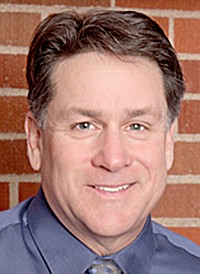Here's to your health.
Many people feel bullet-proof in their teenage years and they have the poor dieting and poor exercising habits to prove it.
Once a person gets well up into adulthood, however, the realization will set in that some healthy changes are in order.
"I've got to take care of this machine," one might say as midlife approaches, "or it won't last long enough to take me to old age."
A youthful look and feel after the age of 40 or 50 is no accident, and most adults understand this.
An interesting book called Younger Next Year by Chris Crowley and Henry S. Lodge offers some insight in that regard.
It says if you want to feel good even though the years keep coming, you must be committed to a few basics.
It recommends several key ingredients to good health, including what we already know about eating right and exercising regularly.
On those items and others, Crowley and Lodge offer insightful and entertaining commentary throughout the book.
Their statements about the importance of exercise are direct.
"If it [exercise] feels like play, great," they wrote, "you're one of the lucky ones. But it is deadly serious, because it is keeping you from becoming a pathetic old fool."
In addition to eating right and exercising, the book includes other suggestions that we don't hear about as much. But the authors contend that they are also vitally important.
As a person approaches the middle of life and beyond, he or she should have a companion, spouse, or significant other to share the journey with, and the authors elaborated on the health benefits that come from that connection.
They also explained that a person needs something that they look forward to as they get up each day--something of interest to them, something that generates excitement.
It can be a passion, an interest, a hobby, a cause, or an occupation, maybe even a second career. This is especially true for those who have retired.
"Retirement can be a fascinating and life-enhancing experience," they wrote, "one of the most interesting and important things that will ever happen to you. But it ain't easy. And it's dumb to sail into it without giving it some serious thought."
One chapter called, "Connect and Commit" was particularly helpful.
Crowley and Lodge said many people struggle with finding out how to spend time in retirement but the important thing is to be around other people and find something for which you have passion.
They wrote, "Do not underestimate the importance of connection and commitment. We were built for it."
They also touched upon the benefits that many individuals find in the spiritual and with the quest for understanding meaning in life.
The book has many redeeming qualities and many insights worth considering, but to be fair, I didn't find every paragraph to be helpful. For instance, more than once they discussed in detail how our bodies are merely the product of millions of years of evolutionary tendencies, but not all of us embrace such theories.
The practical side of the book, however, is worth some serious contemplation.
All of us, as the years go by, understand that our physical body is subject to decay, but the authors of Younger Next Year wrote that we can diminish the effects of the decline with "daily exercise, emotional commitment, reasonable nutrition and a real engagement with living."
In other words, to enjoy life in one's 40s, 50s, 60s, and longer, it is safe to follow their simple advice: "Exercise hard and you will grow younger. Care about other people and you will grow happier. Build a life that you think means something and you will grow richer."
Very good food for thought. And for life.
DAVID WILSON, EdD, OF SPRINGDALE, IS A WRITER, CONSULTANT AND PRESENTER, WHO GREW UP IN ARKANSAS BUT WORKED 27 YEARS IN EDUCATION IN MISSOURI. YOU MAY E-MAIL HIM AT [email protected]. THE OPINIONS EXPRESSED ARE THOSE OF THE AUTHOR.
Editorial on 11/30/2016
